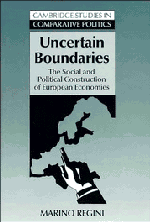Book contents
- Frontmatter
- Contents
- Preface
- Acknowledgements
- Introduction: the shifting boundaries between market, politics and society
- PART I THE RISE AND DECLINE OF THE POLITICAL REGULATION OF THE ECONOMY
- PART II THE MICRO-SOCIAL REGULATION OF ECONOMIC ADJUSTMENT
- 5 The crisis of political exchange and the growth of micro-concertation
- 6 The search for flexibility
- 7 The problem of consensus in production
- 8 An emblematic case: industrial adjustment and micro-concertation in Italy
- Conclusion: the uncertain boundaries between macro and micro – the production of collective goods in the European economies
- Notes
- References
- Index
5 - The crisis of political exchange and the growth of micro-concertation
Published online by Cambridge University Press: 26 May 2010
- Frontmatter
- Contents
- Preface
- Acknowledgements
- Introduction: the shifting boundaries between market, politics and society
- PART I THE RISE AND DECLINE OF THE POLITICAL REGULATION OF THE ECONOMY
- PART II THE MICRO-SOCIAL REGULATION OF ECONOMIC ADJUSTMENT
- 5 The crisis of political exchange and the growth of micro-concertation
- 6 The search for flexibility
- 7 The problem of consensus in production
- 8 An emblematic case: industrial adjustment and micro-concertation in Italy
- Conclusion: the uncertain boundaries between macro and micro – the production of collective goods in the European economies
- Notes
- References
- Index
Summary
In this chapter I describe the simultaneous occurrence of two phenomena which, in the 1980s, characterized the role of organized interests in the economies of several European countries. Because these phenomena have usually been analysed separately, it has proved difficult to capture their overall dynamics. Inevitably, therefore, any conclusion concerning their impact has been at best partial.
On the one hand, the traditional form of social concertation as practised in Europe in the 1970s and early 1980s – that is, macro-concertation at a national level – is now everywhere in decline. The general reasons for the structural instability of systematic political exchange, in whatever form, were discussed in Chapter 2. But what were the specific features of the kind of concertation which was practised in Europe in those years and which today faces severe difficulties?
First, this form of bargaining was strongly political, not so much because of the frequent involvement of the government in formally tripartite negotiation, as because its symbolic function was to exchange legitimation between the government itself and the social partners. Second, this political exchange was highly centralized, both in the sense that it took place at the central (i.e., national) level and in the sense that it was the central component of the industrial relations system. National-level concertation was the pivot around which all inter-actor relationships rotated, and company-level bargaining and other forms of decentralized relationship were subordinate to it. Third, this was largely institutionalized bargaining, to the point that in many cases attempts were made to convert it to periodic formal agreements.
- Type
- Chapter
- Information
- Uncertain BoundariesThe Social and Political Construction of European Economies, pp. 73 - 84Publisher: Cambridge University PressPrint publication year: 1995



